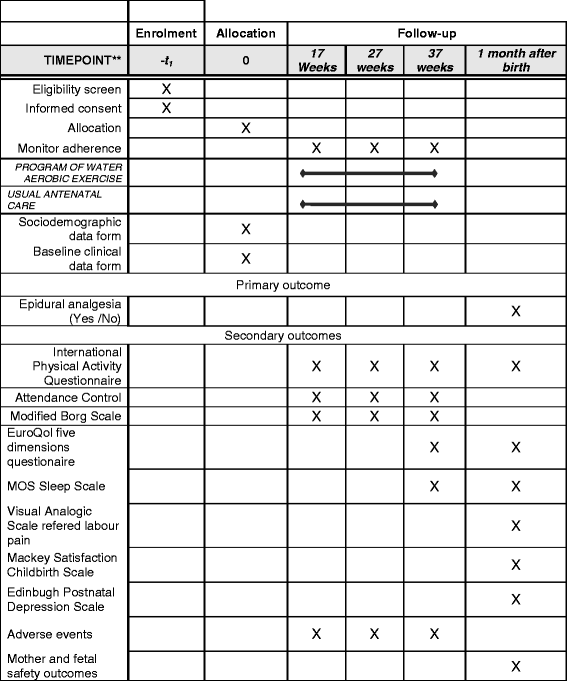Effectiveness and safety of moderate-intensity aerobic water exercise during pregnancy for reducing use of epidural analgesia during labor: protocol for a randomized clinical trial
- PMID: 29642862
- PMCID: PMC5896064
- DOI: 10.1186/s12884-018-1715-3
Effectiveness and safety of moderate-intensity aerobic water exercise during pregnancy for reducing use of epidural analgesia during labor: protocol for a randomized clinical trial
Abstract
Background: Epidural analgesia during labor can provide effective pain relief, but can also lead to adverse effects. The practice of moderate exercise during pregnancy is associated with an increased level of endorphins in the blood, and this could also provide pain relief during labor. Aerobic water exercises, rather than other forms of exercise, do not negatively impact articulations, reduce edema, blood pressure, and back pain, and increase diuresis. We propose a randomized controlled trial (RCT) to evaluate the effectiveness and safety of a moderate water exercise program during pregnancy on the need for epidural analgesia during labor.
Methods: A multi-center, parallel, randomized, evaluator blinded, controlled trial in a primary care setting. We will randomised 320 pregnant women (14 to 20 weeks gestation) who have low risk of complications to a moderate water exercise program or usual care.
Discussion: The findings of this research will contribute toward understanding of the effects of a physical exercise program on pain and the need for analgesia during labor.
Trial registration: ISRCTN Registry identifier: 14097513 register on 04 September 2017. Retrospectively registered.
Keywords: Caesarian; Delivery; Epidural anesthesia; Exercise; Natural childbirth; Postnatal depression.
Conflict of interest statement
Consent for publication
Non aplicable.
Competing interests
The authors declare that they have no competing interests.
Publisher’s Note
Springer Nature remains neutral with regard to jurisdictional claims in published maps and institutional affiliations.
References
-
- Glosten B. Epidural and spinal analgesia/anesthesia:local anesthetic techniques. In: DH C, editor. Obstetric anaesthesia. 2. St. Louis: Mosby; 1999. pp. 360–386.
-
- Anim-Somuah M, Smyth RM, Jones L. Epidural versus non-epidural or no analgesia in labour. Cochrane Database Syst Rev. 2011;12:CD000331. - PubMed
-
- Howell CJ, Kidd C, Roberts W, Upton P, Lucking L, Jones PW, Johanson RB. A randomised controlled trial of epidural compared with non-epidural analgesia in labour. BJOG. 2001;108(1):27–33. - PubMed
-
- Declercq ER, Sakala C, Corry MP, Applebaum S. Listening to mothers II: report of the second National U.S. survey of Women’s childbearing experiences: conducted January-February 2006 for childbirth connection by Harris interactive(R) in partnership with Lamaze international. J Perinat Educ. 2007;16(4):9–14. doi: 10.1624/105812407X244769. - DOI - PMC - PubMed
Publication types
MeSH terms
Grants and funding
LinkOut - more resources
Full Text Sources
Other Literature Sources
Medical


